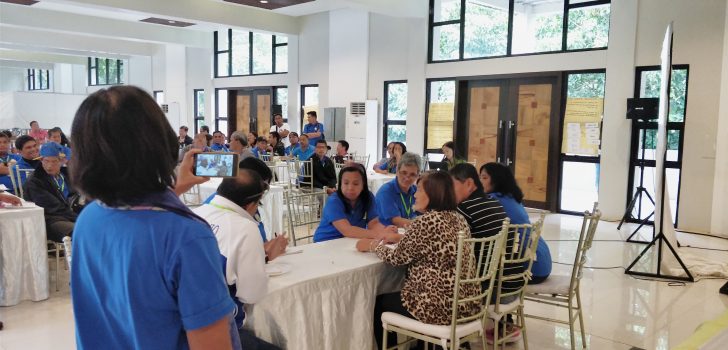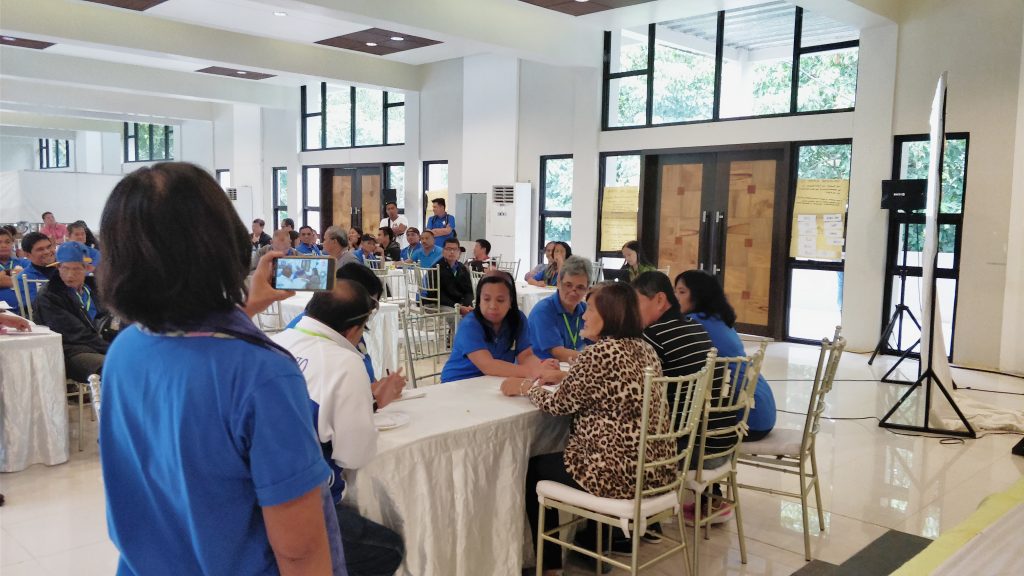 Participants from San Antonio, Laguna act out a "good" meeting to resolve the grievance presented to them. This is an activity where imagined grievances based on real life scenarios were handed out to groups for them to solve it. (Photo by Lawrence Albert Bariring)
Participants from San Antonio, Laguna act out a "good" meeting to resolve the grievance presented to them. This is an activity where imagined grievances based on real life scenarios were handed out to groups for them to solve it. (Photo by Lawrence Albert Bariring) PRDP strengthens grievance redress in barangays
The PRDP CALABARZON aims to strengthen the grievance redress mechanism (GRM) in the region through a three-day training held on November 14–16.
One of the tools used by the PRDP, the GRM is used to facilitate the systematic reporting of issues and problems raised by concerned citizens. Despite of its name, this can also be used by residents to relay the good practices that they have observed in the subproject implementation.
The training participants came from the barangays with ongoing infrastructure subprojects in the provinces of Batangas, Laguna, and Quezon. Meanwhile, the resource speakers were from the PRDP Social and Environmental Safeguards (SES) Units at the national, cluster, and regional levels.
The activity aims to capacitate not only the GRM focal persons at the provincial, city, and municipal levels, but the barangay officials as well, since they are at the frontline resolving grievances.
“In previous workshops, we already trained the grievance point persons at the municipal, city, and provincial levels. Today, we need to relay the same information to our partners at the barangay level,” NPCO Social Safeguards Officer Bey de Castro said.
The speakers discussed that concerned citizens can air their grievances through text messages, calls, e-mails, drop boxes, online forms, and face-to-face communication with the Project staff and partners. The barangays and other local government units with ongoing subprojects have grievance point persons. The concerned residents can also approach the SES focal persons.
“We will act on all grievances, anonymous or not. If anonymous, the grievance committee will visit the site to inspect and see if there really is a violation or not,” RPCO SES Officer Cyrile Gabriel said.
Gabriel also said that all grievances must be remedied at the barangay, municipal/city, or provincial level. Only when the complainants deem that the suggested solutions fall below their expectations or that no solutions are being given, the grievances can be relayed to a higher level or at the PRDP regional, cluster, and national offices or at the World Bank.
According to the CALABARZON RPCO SES Unit, the most common grievance pertains to compensation for right-of-way holders. While many of these problems are solved at the level of the municipal or city government, sometimes, it can still go to the PRDP office level. However, “We will try to maximize our efforts to come up with suitable solutions for all parties affected,” Gabriel said.
One of the activities conducted during the training is a role-playing wherein the participants acted out scenarios adapted from real grievance cases of PRDP. ### (Lawrence Albert A. Bariring, DA-PRDP CALABARZON RPCO InfoACE Unit)

Participants from San Antonio, Laguna act out a “good” meeting to resolve the grievance presented to them. This is an activity where imagined grievances based on real life scenarios were handed out to groups for them to solve it. (Photo by Lawrence Albert Bariring)
